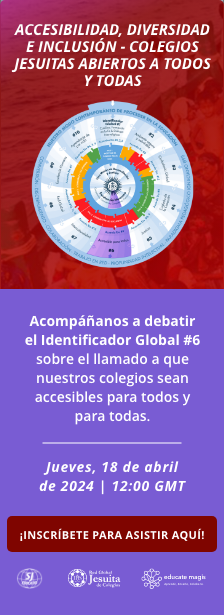We want you to leave here with a sense of responsibility to society, we want you always to be bothered always by the thought that there is injustice in the world.
Did anyone have a chance to read this talk titled, “Conscience” delivered at the Directors of Teaching Conference at St Aloysius’ College Milsons Point on 19-20 May 15 by Ross Jones, SJ. I would love to get your thoughts! (see the blue link above this conversation to get access to this talk.)
I believe Ross has done us a good service. This is a resource that we can use and reuse. Some nice background and definition on Conscience. Some great scene setting and some compelling content for any educator who wants to prepare to facilitate discussion and reflections with teachers, students, parents or past-students.
There feels like there is a movement to the 4 C’s in Jesuit Education around and Ross touches on this:
“When you pick up all the recent documents to do with Jesuit education, we find them outlining those key elements of our education. Firstly there was competence, conscience and compassion, then shortly after emerged competence, conscience and compassionate commitment. The most recent iteration of the Cs has seen commitment break free to become competence, conscience, compassion and commitment.”
Some neat theological explorations on conscience in the paper from Ross:
“When one decides to do this or that, or not to do this or that, one is acting out of conscience. Conscience is the radical experience of ourselves as moral agents. But since we never know ourselves completely (self-knowledge is something you work at and is not ready-made), decisions of conscience are necessarily incomplete and partial.”
“The Rabbi Zusya said a short time before his death, “In the world to come, I shall not be asked, “Why were you not Moses?” Instead, I shall be asked, “Why were you not Zusya?” That is, conscience demands one be true to oneself.”
Some fascinating insights into conscience and authority in the paper from Ross:
“Anyone upon whom the ecclesiastical authority, in ignorance of true facts, imposes a demand that offends against his clear conscience, should perish in excommunication rather than violate his conscience.” (Thomas Aquinas, IV Sentences, dist 38, q2, a4, in the thirteenth century)
“Certainly, if I am obliged to bring religion into after-dinner toasts, (which indeed does not seem quite the thing) I shall drink, – to the Pope, if you please, – still, to Conscience first, and to the Pope afterwards.” Blessed John Henry Cardinal Newman (who was very cautious about the declaration of papal infallibility in the First Vatican Council) in a letter to the Duke of Norfolk.
“Over the pope as the expression of the binding claim of ecclesiastical authority, there still stands one’s own conscience, which must be obeyed before all else, if necessary even against the requirement of ecclesiastical authority.” then Archbishop Joseph Ratzinger!!
I like these as pieces of text we might use with Teachers as part of a discussion / reflection exercise:
“Young people of today listen more willingly to witnesses than to teachers, and if they do listen to teachers, it is because they are witnesses.” Pope Paul VI, Evangelii Nuntiandi (“On Evangelization in the Modern World”), 1975, n. 41
“In their formative years with us, we move boys from engaging solely in works of charity in their younger years, to include (as they develop intellectually, and then influentially) works of justice. The conscientising, especially in community service and immersions, should motivate them then to influence the centres of decision-making. Experientia docuit, as Ignatius wrote – experience teaches. In my experience, it is the constant refrain from parents of boys who return from Immersions. They say they now see and feel things differently.”
I like these as pieces of text we might use with Students as part of a discussion / reflection exercise:
The Seven Social Sins, written in 1925 by Mahatmas Gandhi:
“Politics without principle
Wealth without work
Commerce without morality
Pleasure without conscience
Education without character
Science without humanity
Worship without sacrifice.”
A really simple line that might be used with students of all faiths and none:
“Conscience summons us to love good and avoid evil.” (from the Vatican II document, the Pastoral Constitution on the Church in the Modern World.)
From the same document a “beautiful image”, that might be used with students with a belief in God or open to such belief:
“To obey [conscience] is the very dignity of the human person; according to it, the person will be judged. Conscience is the most secret core and sanctuary of a person. There the person is alone with God, whose voice echoes in the depths of the person.”
I also really like these as pieces of text we might use with Students as part of a discussion / reflection exercise. These are on the topic of Social Justice:
“The obligation to provide justice for all means that the poor have the single most urgent economic claim on the conscience of the nation.” (US Catholic Bishops, Economic Justice for All, #86, 1986)
“On the part of the rich man, it calls for great generosity, willing sacrifice and diligent effort. Each man must examine his conscience, which sounds a new call in our present times. Is he prepared to support, at his own expense, projects and undertakings designed to help the needy? Is he prepared to pay higher taxes so that public authorities may expand their efforts in the work of development? Is he prepared to pay more for imported goods, so that the foreign producer may make a fairer profit? Is he prepared to emigrate from his homeland if necessary and if he is young, in order to help the emerging nations?” (Paul VI, Populorum progressio, #47, 1967)
“the more fortunate should renounce some of their rights so as to place their goods more generously at the service of others”. (Pope Francis, Evangelii Gaudium 190)
Finally I like these as pieces of text we might use with Parents and Past-Students as part of a discussion / reflection exercise:
From Fr. Joseph McShane SJ, currently the President of Fordham University on the hopes / objectives of Jesuit Education for graduates:
“We want them to be bothered. We want you to leave here with a sense of responsibility to society, we want you always to be bothered always by the thought that there is injustice in the world.”
And from Ross himself to new parents of students in Australia:
“Here we are keen to create a certain restlessness in your sons. There is a tension that confronts any school in the Jesuit tradition, concerned as it is with the total formation of its students: The school must fulfil the expectations of those whom it serves (i.e., satisfying the needs of government legislation, giving students excellent preparation for the next phase of studies or career, good grades in state or national exams) — of course. We never eschew excellence. But a school must also be countercultural, just as the Gospel is countercultural. It must disturb its students and the community around it. It must prick their consciences to make them want to change that which needs changing. It is that little burr we try to lodge under each boy’s saddle. A niggling restlessness that will not allow an Ignatian to rest easy, or be content, while another is treated with less than that full human dignity which is the right of all. It is a passion that sometimes challenges the status quo. Our students will have attitudes challenged and changed. They may even become change agents. In that process they may often leave the school with outcomes quite different to the expectations which either they or their parents had at enrolment. If so, that will be well within the ambit of the Jesuit tradition.”
Inicia sesión o Hazte miembro
para crear y ver comentarios

